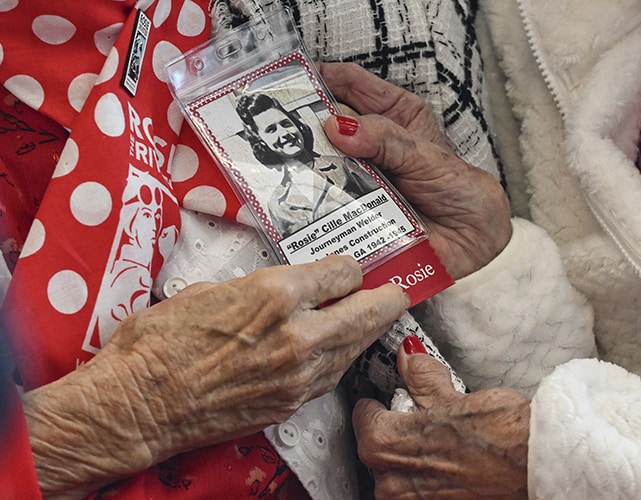Soon after the attack on Pearl Harbor in 1941, Marian Sousa moved to California to care for the children of her sister Phyllis Gould, who had gone to work as a welder in a Bay Area shipyard.
Just a year later, Sousa, at 17 years old, joined the wartime workforce herself, drafting blueprints and revising outdated designs for troop transports. Wearing a hard hat and holding a clipboard in hand, she would accompany maritime inspectors onboard ships she’d helped design and examine the product of her labors.
She and her sister were just two of the roughly 6 million women who went to work during World War II, memorialized by the now iconic recruitment poster depicting Rosie the Riveter, her hair tied back in a kerchief, rolling up the sleeve of her denim shirt and flexing a muscle beneath the slogan, “We can do it!”
More than eight decades later, Sousa, now 98, gathered at the Capitol on April 10 with around two dozen other so-called Rosies — many of them white-haired and most wearing the red with white polka dots made famous by the poster — to receive the Congressional Gold Medal in honor of their efforts.
“We never thought we’d be recognized,” Sousa said in an interview. “Just never thought — we were just doing the job for the country and earning money on the side.”
Congressional Action After Years of Urging
Congress passed legislation authorizing the medal in 2020, after years of urging by Gould, who died in 2021, and another Rosie, Mae Krier, who accepted the award at the ceremony on behalf of all Rosies in front of a crowd of roughly 600, including congressional leaders.
“Up until 1941, it was a man’s world. They didn’t know how capable us women were, did they?” Krier said April 10, to cheers. “We’re so proud of the women and young girls who are following in our lead. I think that’s one of the greatest things we’ve left behind, is what we’ve done for women.”
The Rosies went to work out of necessity. During the war, women were desperately needed to fill jobs vacated by men who had left to serve in the armed forces. Shortly after graduating from high school, Sousa took a six-week course in engineering drawing at the University of California, Berkeley, and answered the call.
“It was a time when everybody went to work,” she said. “This was a time when the United States was truly united, in one effort. We wanted to get the war over with and bring the guys back.”
Demonstrating that Women Could do the Work
Many women were forced out of their jobs when the men returned after the war. Still, the experience shaped the rest of their lives and demonstrated that women could do work that had been traditionally reserved for men.
“These enterprising and patriotic women answered the call to serve on the homefront during World War II and forever changed the role of women in the workforce,” Sen. Susan Collins, R-Maine, a lead sponsor of the legislation, said during the ceremony.
Krier, who spent years pressing for a National Rosie the Riveter Day, built B-17 and B-29 bomber aircraft at a Boeing factory in Seattle during the war. She turned 98 on March 21 — the date Congress has designated National Rosie the Riveter Day.
“I think they got sick and tired of hearing from me — it’s been going on for years,” Krier said in an interview about her efforts to win broader recognition for the Rosies. “It’s just wonderful to finally get the award.”
Gloria McCormack, 99, attended the ceremony with her daughter, granddaughter and two grandsons. A week after graduating high school in 1942, McCormack got an engineering job at an Ohio defense plant manufacturing machine guns and shipping them overseas to Allied forces.
She recalled going to the plant every day with her father, who worked at a nearby steel factory, and conducting time studies on machine guns alongside other teenage girls and military wives. At lunch time, McCormack recalled in an interview, she and “the girls” went across the street to a restaurant that had a jukebox.
“We put nickels in it and did the jitterbug,” she said. “We danced all through our lunch hour.”
Velma Long, 106, earned a Bachelor of Science degree and worked as a clerk typist for the Navy in Washington during the war. She remembers being the only Black woman in her office at the time and receiving letters from her older brother, who was deployed overseas, with sentences blotted out.
“I feel honored — and I feel I deserve to be,” Long, who went on to take more courses and become a social worker after the war, said about receiving the Congressional Gold Medal.
Sen. Bob Casey, D-Pa., credited Krier’s activism with ensuring that the history of the Rosies would not be forgotten.
“We all know the iconic image of Rosie the Riveter, but for too long, the remarkable women she represents did not get the recognition they deserve,” Casey, who sponsored legislation to honor the Rosies, said during the ceremony. “World War II would not have been won if it weren’t for the Rosies at home.”
Krier, for her part, had a message for the young girls of today:
“Remember these four little words: We can do it!”
c.2024 The New York Times Company. This article originally appeared in The New York Times.







